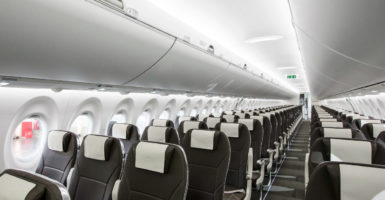With the clock ticking fast toward the July 15 expiration date for the Federal Aviation Administration’s authorization, House and Senate negotiators have finally reached a deal for a short-term extension.
Though both the House and the Senate produced separate, divergent bills, the extension is needed because House and Senate leaders could not agree upon a path forward for either of their proposals. The House version foundered because of a controversial proposal to privatize air traffic control, while the Senate passed a shorter-term bill that was not taken up in the House.
The agreement for the 14-month extension was reached Wednesday—a mere 9 days before the authorization lapses—though the bill itself is still unavailable. What’s clear, though, is that the extension won’t be “clean,” which, in the absence of the will to enact positive reforms, would be the preferable path forward in order to continue efforts to produce a viable free-market bill.
The extension would require air carriers to refund baggage fees if bags are lost or “unreasonably delayed” based on an arbitrary time limit decided by Congress.
Instead, it contains myriad policy provisions as decided by the negotiators, many of which appear to have come from the previous proposals. Though the committees have not yet released legislative text, the House Transportation and Infrastructure committee’s summary gives some idea of the provisions it will contain.
At a first glance of the details available, the extension does not seem to contain many major policy changes. In that regard, it is better than the Senate-passed bill (the only other viable option that could be passed before the deadline), which increased spending and extended the federal intrusion further into the aviation industry.
The extension appears to keep FAA funding at current levels, providing $3.35 billion to the Airport Improvement Program. This compares to a 12 percent increase for 2017 (up to $3.75 billion) that was built into the Senate’s version. Keeping grant funding levels flat is a preferable alternative to increasing unnecessary spending, and should provide a path forward to phasing out the federal role in funding airports.
The proposal appears to make some modest changes to aviation safety and addresses aviation security concerns. Strengthening airport security is an appropriate response to recent incidences, and one promising provision would expand efficiency by optimizing the TSA PreCheck system through partnering with the private sector. However, the nation’s airport security system needs a comprehensive overhaul through increased private screening—which is more efficient and effective—instead of tweaking the broken system.
Though the extension appears to eschew many of the harmful regulations in the Senate bill, it still contains several that are problematic. The most egregious is the micromanagement of airline business practices. The extension would require air carriers to refund baggage fees if bags are lost or “unreasonably delayed” based on an arbitrary time limit decided by Congress. The Congressional Budget Office estimates that this mandate could cost airlines $10 million annually, which would likely be passed on to all passengers in the form of higher ticket prices.
Airlines clearly have an incentive to provide customers with the best service and necessary compensation if such incidences occur in order to keep their business. They should be allowed to develop their own standards instead of forcibly adhering to arbitrary federal rules.
Likewise, the bill would require airlines to “generally ensure” that minors aged 13 years and under are seated next to an accompanying adult. Again, air carriers should be allowed to develop their own practices for these situations, and indeed, the mandate could lead to instances where families or other passengers are charged more or encounter other adverse impacts in order for the carriers to comply.
This excessive federal management of air carrier business practices harkens back to the years before airline deregulation where the government set routes and ticket prices. They should not be included in a short-term authorization.
Because the legislative text is not yet available, the bill may contain other provisions not outlined in the summary. Other areas worth looking out for are spending increases, the promulgation of drone regulations, other burdensome “consumer protection” mandates, and the possible inclusion of green energy tax breaks.
Though the short-term authorization is preferable to the Senate’s far-reaching bill, a clean authorization without the inclusion of harmful regulations is a better way forward. This will allow Congress to continue working toward reforming the aviation system by privatizing air traffic control, eliminating the federal government from the airport business, and furthering free market principles for commercial aviation and new drone technologies.




























